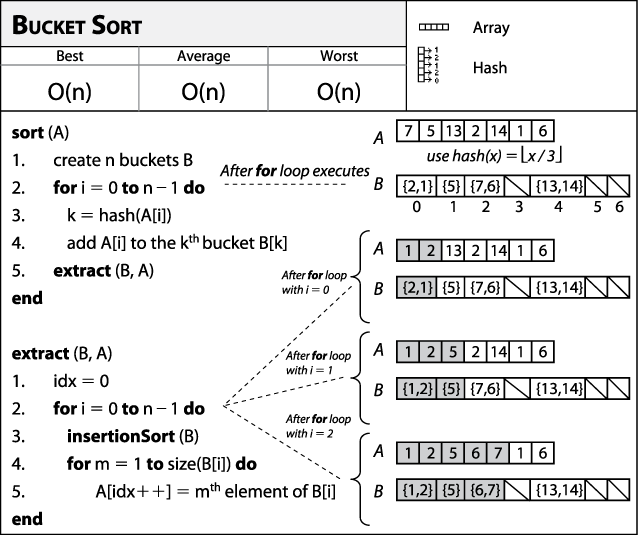Bucket Sort
SortGiven a set of n elements, Bucket Sort constructs a set of n buckets into which the elements of the input set are partitioned; If a hash function, hash(A_i), is provided that uniformly partitions the input set of n elements into these n buckets, then Bucket Sort can sort, in the worst case, in O(n) time.
You can use Bucket Sort if the following two properties hold:
-
Uniform distribution: The input data must be uniformly distributed for a given range. Based on this distribution, n buckets are created to evenly partition the input range.
-
Ordered hash function: The buckets must be ordered. That is, if i < j, then elements inserted into bucket b_i are lexicographically smaller than elements in bucket b_j.

// Performs a bucket sort of an array in which all the elements are
// bounded in the range [min, max]. For bucket sort to give linear
// performance the elements need to be uniformly distributed
public static void bucketSort(int[] nums, final int min, final int max) {
if (nums == null || nums.length == 0 || min == max) return;
// N is number elements and M is the range of values
final int N = nums.length, M = max - min, NUM_BUCKETS = M / N + 1;
List<List<Integer>> buckets = new ArrayList<>(NUM_BUCKETS);
for (int i = 0; i < NUM_BUCKETS; i++) buckets.add(new ArrayList<>());
// Place each element in a bucket
for (int i = 0; i < N; i++) {
int bi = (ar[i] - min) / M;
buckets.get(bi).add(nums[i]);
}
// Sort buckets and stitch together answer
for (int bi = 0, j = 0; bi < NUM_BUCKETS; bi++){
List<Integer> bucket = buckets.get(bi);
if (bucket != null)
Collections.sort(bucket);
for (int num : bucket)
nums[j++] = num;
}
}